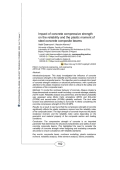This study investigated the influence of concrete compressive strength on the reliability and the plastic resistance moment of steel-concrete composite beams. The objective was to evaluate the impact of concrete strength variations on structural performance, with a particular attention to the plastic resistance moment which is critical to the safety and compliance of the composite beam.
Methods: To model the nonlinear behavior of concrete, Abaqus created a three-dimensional numerical model including a concrete damage plasticity (CDP) model. Reliability analysis was performed, and the failure probability was assessed using Monte Carlo simulations (MCS) and first-order (FORM) and second-order (SORM) reliability methods. The limit state function was determined according to Eurocode 4 criteria considering the concrete compressive strength of 25 to 80 MPA.
Results: As a result, it was found that the compressive strength of concrete significantly affects the plastic resistance moment and the reliability index of the composite beam. The high strength of concrete improves the plastic resistance moment, and the reliability index varies depending on the geometric and material property of the composite section and loading conditions.
Conclusion: The compressive strength of concrete is an important parameter that determines the structural characteristics and safety of steel-concrete composite beams. This highlighted the need to consider the variability of concrete strength when designing and evaluating composite structures to ensure compliance with reliability standards.
